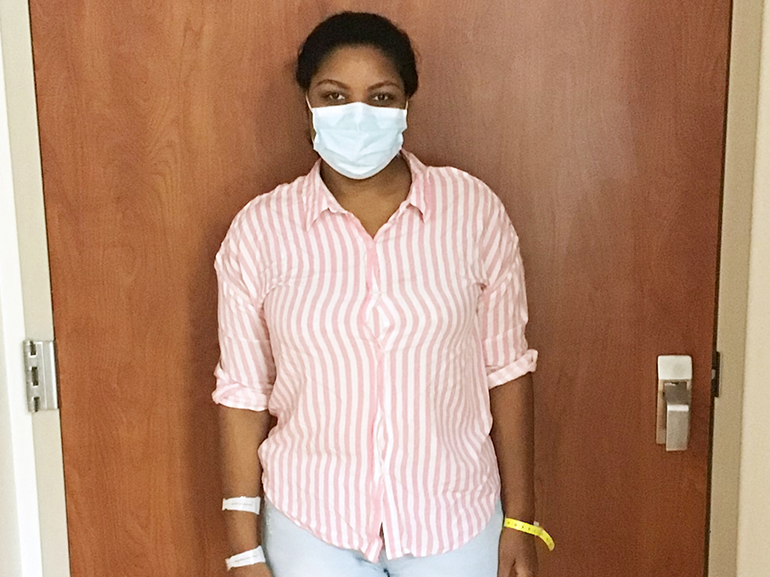Chandra's Story

A native of New Orleans, Chandra Hawkins, 35, works as an administrative assistant. In 2015, she was diagnosed with Multiple Sclerosis (MS), but didn’t take the news seriously and went on raising her three children, working and living her life.
Six years later, however, Chandra’s legs began to weaken and give out without notice. Her condition quickly progressed to the point where one day, shortly after starting to drive her son to school, she was unable use both hands on the steering wheel because her left hand was shaking so badly.
Then, Chandra started walking with a limp that was significant enough for her co-workers to notice. Still, she went about her work until a colleague expressed concern and suggested she sit down for a bit. She encouraged Chandra to call the doctor and get checked out. Chandra appreciated the concern, but believed the issue would resolve after a good night’s sleep. However, when the problems continued, her fiancé, Barnell, urged her to go to the emergency department at Ochsner Medical Center. Doctors there ordered an MRI which confirmed Chandra was experiencing a flare-up of her MS, which is when there is an occurrence of new symptoms or the worsening of previous symptoms.
Chandra spent the next four days at Ochsner Medical Center, where she began receiving physical therapy to address the weakness in her hand and legs. Chandra and her doctors decided that because she was not physically ready to return home, additional recovery time at Northshore Rehabilitation Hospital would be the best next step. This decision was made easier for Chandra because the hospital was not far from her home, children and fiancé.
Upon admission to Northshore, Chandra’s goals were to regain her ability to walk, get feeling back in her hand and increase strength and endurance so she could “just feel like herself again.” Her physician-led team of physical and occupational therapists set Chandra up with a rehabilitation care plan to help her reach those goals.
Chandra’s physical therapists utilized the SCIFIT upper body exerciser and lower body recumbent bike to help her retrain her muscles and nerves. They also used an e-stim machine, which generates electric impulses that stimulate muscles to contract, on Chandra’s hands. This helped to improve movement, which Chandra said was “tremendously helpful.” Physical therapists also worked with Chandra in the parallel bars, using an overhead body-weight support harness to practice her walking. Simultaneously, occupational therapists guided Chandra on different ways to complete her personal care tasks, including dressing and bathing, so that she could be as independent as possible.
Chandra said that her turning point was also her lowest point. She did not feel her progression was happening fast enough, stating “it almost felt like a punishment for ignoring my MS for so long.” Chandra remembers feeling defeated when she didn’t even have the dexterity to pick up dice. The next day, however, Chandra was playing a game of Connect 4 as part of her occupational therapy and she was finally able to grasp the game piece and place it the rack. “That is when I realized that things were going to turn around for me,” she shared.
Chandra credits Barnell in playing a large role in her recovery process. The fact that he was able to “hold down the fort” and take care of the kids all while making sure Chandra had the support she needed was “really daunting.” This allowed Chandra to focus fully on her recovery and not spend too much time worrying about what was happening at home.
Chandra describes her time at Northshore Rehabilitation as “hard” because she wasn’t used to accepting help and had always been able to do things for herself. She shared that the rehabilitation process was a “humbling and eye-opening experience” but she learned to rely on others and accept help when she needs it.
After 13 days, Chandra made great progress. While she was still working on her balance, she felt much more like herself and was grateful that she has use of her hand again. While she couldn’t wait to return home to Barnell and the kids, Chandra said, “I might cry when I leave because everyone at Northshore has been so nice to me.” She added, “During those few rough times I had, the staff was right there to cheer me up and help me feel comfortable about myself again. She also shared, “I am not as invincible as I thought.” Her advice for anyone dealing with MS is to not ignore the little signs of a flare up, because when it appears full-force, you will definitely not be able to ignore it. Listen to what your body is telling you.”